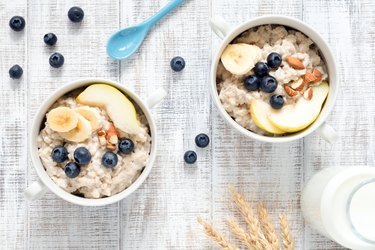
Not only is it a breakfast staple, but high-fiber, heart-healthy oatmeal comes with several health benefits, like lowering your cholesterol, stabilizing blood sugar levels and helping you maintain a healthy weight, according to the Cleveland Clinic.
But is oatmeal constipating?
Video of the Day
Video of the Day
While you may have heard that oatmeal is "binding," it can actually help relieve constipation, making it a natural laxative if you're having a hard time "going." The key? It's high in poop-promoting fiber.
Read on for more on oatmeal's benefits for constipation along with other tips to get things moving again.
How Fiber Can Alleviate Constipation
Constipation is when you have infrequent bowel movements (fewer than three per week) or difficulty pooping, per the Mayo Clinic. It often shows up as hard, dry or lumpy stool; painful poops and feeling like you can't empty stool out of your rectum.
Causes of constipation can vary, according to Jacqueline Wolf, MD, a Boston-based gastroenterologist, but a common one is not getting enough fiber in your diet. Fiber helps you poop because it bulks up your stool and softens it, making it easier to pass, per the Mayo Clinic.
Oatmeal is high in fiber, which makes it a good choice when you're constipated. One cup of oatmeal (cooked in water) provides 4 grams of fiber, per the USDA.
To put that into perspective: The 2020-2025 Dietary Guidelines for Americans recommend adults get between 22 and 34 grams of fiber each day (about 14 grams for every 1,000 calories you eat).
However, most people don't get enough fiber in their diets, per the American Society for Nutrition (only 7 percent of adults meet the daily recommendation).
Dr. Wolf says she has some of her patients try adding oatmeal to their diets when they're dealing with constipation. "You can certainly try using it," she says.
Unlike laxatives or other medications, eating oatmeal for constipation doesn't come with any risks. You'll just need to be sure to drink plenty of water, too (more on that in a minute).
It's not a cure-all, though: "I don't think it will do the trick alone, but if you're not getting enough fiber then you definitely need more in your diet," Dr. Wolf says.
In other words, oatmeal is a healthy addition to your diet when you're constipated, but it shouldn't be the only change you make.
Other Considerations for Constipation
Keep these other tips in mind when you're dealing with constipation:
1. Eat Other Fiber-Rich Foods
As we mentioned, oatmeal alone isn't likely to cure constipation. It's a good, high-fiber choice, but you should eat other foods high in fiber to help you meet your daily requirement for the nutrient, including:
- Fruits and vegetables
- Beans, legumes and lentils
- Nuts and seeds
- Whole grains such as spelt, amaranth and buckwheat
- Firm tofu
Tip
Don't overdo it with fiber. Eating more than 50 grams of fiber per day can interfere with the absorption of certain nutrients, such as calcium, iron, magnesium and zinc, according to the Mayo Clinic.
2. Drink Plenty of Water
Staying well-hydrated can help treat and prevent constipation, according to the National Institute of Diabetes and Digestive and Kidney Diseases (NIDDK). This is especially important when you're eating more fiber, Dr. Wolf says.
Aim to drink about half your body weight in ounces each day. So, if you weigh 180 pounds, for example, try to drink 90 ounces, or about 11 cups.
Increasing your fiber intake too quickly and neglecting hydration could actually cause constipation or other GI issues like bloating, gas or diarrhea, Dr. Wolf says. So, as you up your fiber from foods like oatmeal, make sure you also increase your water intake to help relieve constipation.
3. Get Some Exercise
Exercising about half an hour each day can also help keep you regular, according to the NIDDK. So after your bowl of morning oatmeal, take a stroll or bike ride around the block.
4. Don't Hold It
Once you feel the urge to go, head to the bathroom. "If you wait, you often lose the urge to go, then it's harder to relieve yourself," Dr. Wolf says.
- Mayo Clinic: "Constipation"
- Cleveland Clinic: "Is Oatmeal Always Healthy for Breakfast?"
- 2020-2025 Dietary Guidelines for Americans
- Mayo Clinic: "Dietary Fiber: Essential for a Healthy Diet"
- USDA FoodData Central: "Cereals, oats, instant, fortified, plain, prepared with water (boiling water added or microwaved)"
- American Society for Nutrition: "Most Americans Are Not Getting Enough Fiber in Our Diets"
- National Institute of Diabetes and Digestive and Kidney Diseases: "Treatment for Constipation"
Was this article helpful?
150 Characters Max
0/150
Thank you for sharing!
Thank you for your feedback!
Is this an emergency? If you are experiencing serious medical symptoms, please see the National Library of Medicine’s list of signs you need emergency medical attention or call 911.


